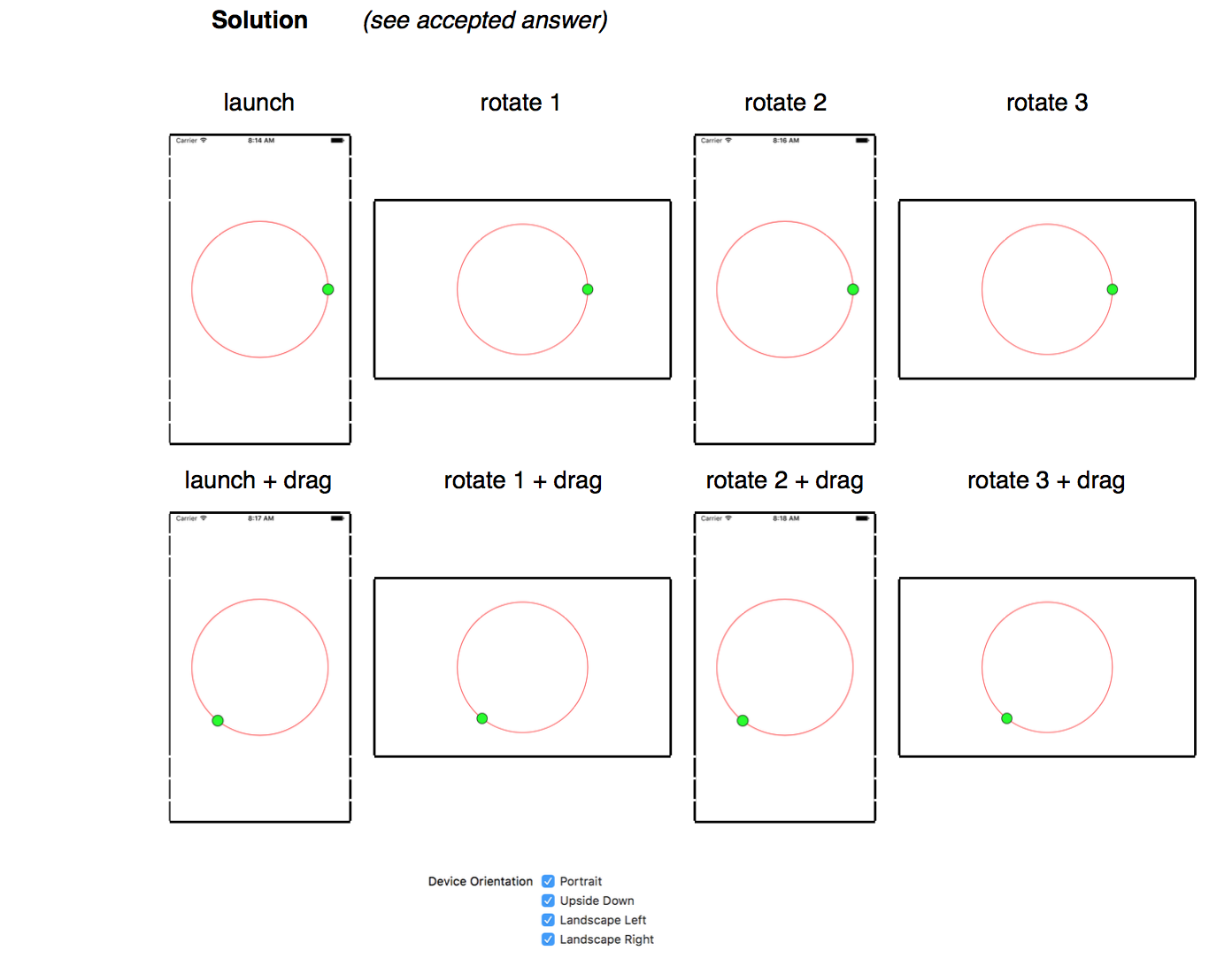I’d like a ball to track my finger as I drag it along a circular trajectory for every allowable device orientation on iPhone or iPad. Views appear to be correctly centred when a device is rotated but the ball will not stay on the circumference and seems to go anywhere when I drag it.
EDIT
Martin R's answer now displays this as required. My only additional code change was to remove an unnecessary declaration var shapeLayer = CAShapeLayer()
The maths in this example made perfect sense until I tried constraining both ball and trajectory to the view's centre and adding the ball’s centre coordinates as offsets at run time. I followed these recommendations on how to constrain a view.
There are three things I don’t understand.
First, calculating the circle’s circumference from two variables trackRadius and angle theta and using sin and cos of theta to find x and y coordinates will not place the ball in the right position.
Second, using atan to find the angle theta between the view centre and the point touched, and using trackRadius with theta to find x and y coordinates will not place or move the ball to a new place along the circumference.
And third, whenever I drag the ball, a message in the debug area says that Xcode is Unable to simultaneously satisfy constraints, although no constraints problems are reported prior to dragging it.
There may be more than one problem here. My brain is starting to hurt and I’d be grateful if someone could point out what I have done wrong.
Here is my code.
import UIKit
class ViewController: UIViewController {
override var supportedInterfaceOrientations: UIInterfaceOrientationMask { return .all }
var shapeLayer = CAShapeLayer()
let track = ShapeView()
var ball = ShapeView()
var theta = CGFloat()
private let trackRadius: CGFloat = 125
private let ballRadius: CGFloat = 10
override func viewDidLoad() {
super.viewDidLoad()
createTrack()
createBall()
}
private func createTrack() {
track.translatesAutoresizingMaskIntoConstraints = false
track.shapeLayer.path = UIBezierPath(ovalIn: CGRect(x: -trackRadius, y: -trackRadius, width: 2 * trackRadius, height: 2 * trackRadius)).cgPath
track.shapeLayer.fillColor = UIColor.clear.cgColor
track.shapeLayer.strokeColor = UIColor.red.cgColor
view.addSubview(track)
track.centerXAnchor.constraint(equalTo: view.centerXAnchor).isActive = true
track.centerYAnchor.constraint(equalTo: view.centerYAnchor).isActive = true
}
private func createBall() {
let offset = placeBallOnCircumference()
drawBall()
constrainBall(offset: offset)
let touch = UIPanGestureRecognizer(target: self, action:#selector(dragBall(recognizer:)))
view.addGestureRecognizer(touch)
}
private func placeBallOnCircumference() -> CGPoint {
let theta: Double = 0 // at 0 radians
let x = CGFloat(cos(theta)) * trackRadius // find x and y coords on
let y = CGFloat(sin(theta)) * trackRadius // circle circumference
return CGPoint(x: x, y: y)
}
func dragBall(recognizer: UIPanGestureRecognizer) {
var offset = CGPoint()
let finger : CGPoint = recognizer.location(in: self.view)
theta = CGFloat(atan2(Double(finger.x), Double(finger.y))) // get angle from finger tip to centre
offset.x = CGFloat(cos(theta)) * trackRadius // use angle and radius to get x and
offset.y = CGFloat(sin(theta)) * trackRadius // y coords on circle circumference
drawBall()
constrainBall(offset: offset)
}
private func drawBall() {
ball.shapeLayer.path = UIBezierPath(ovalIn: CGRect(x: 0, y: 0, width: 2 * ballRadius, height: 2 * ballRadius)).cgPath
ball.shapeLayer.fillColor = UIColor.cyan.cgColor
ball.shapeLayer.strokeColor = UIColor.black.cgColor
view.addSubview(ball)
}
private func constrainBall(offset: CGPoint) {
ball.translatesAutoresizingMaskIntoConstraints = false
NSLayoutConstraint.activate([
ball.centerXAnchor.constraint(equalTo: view.centerXAnchor, constant: offset.x),
ball.centerYAnchor.constraint(equalTo: view.centerYAnchor, constant: offset.y),
ball.widthAnchor.constraint(equalToConstant: trackRadius),
ball.heightAnchor.constraint(equalToConstant: trackRadius)
])
}
}

